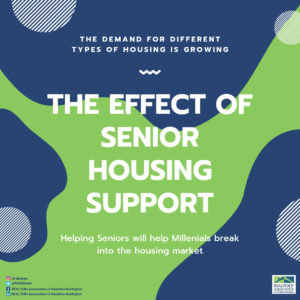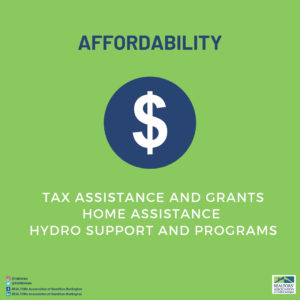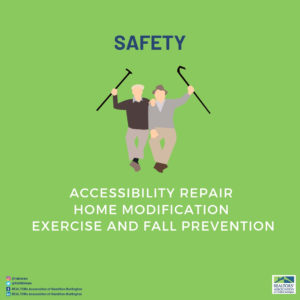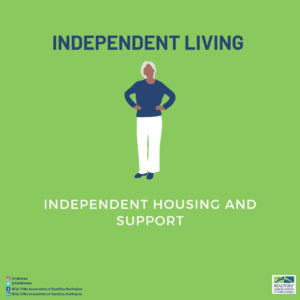Jun 28, 2019 | Uncategorized |
With an aging population continuing to grow, there has become a growing need for REALTORS® to specialize in selling and buying senior homes. Although once called a niche, Ontario’s senior population is projected to double from 16.7% of the population to about 24.8% of the population by 2041, because of the growing number of seniors; senior home buying and selling are becoming standard practice.
Some of the service and systems that come with being a REALTOR® specialized in senior real estate are:
Extra Help and Guidance
Many seniors are living alone in their home and are unaware of the next steps. A REALTOR® trained to work with seniors will set up a free initial consultation to offer guidance about the home buying/selling process and will present all the option for the transition. Depending on the client, this may be one or more home visits to make sure that the client feels informed and comfortable.
Slower Pace
The home selling/buying process is complex, and many terms, ideas, and contracts are presented during the process. Senior home buyers/sellers benefit from a slower pace so they can feel relaxed and not rushed into a significant decision.
Contracts in Plain English
REALTOR® will make sure that they can sit down with the client with a form of the contract that has large print and written in layman’s terms. This further consultation will allow for any questions and concerns to be raised initially before the final signing.
Encouragement
Every client is different. Some may not wish for family members to be privy to the details of their real estate transactions, while others may want their family members to be highly involved. A good REALTOR® should also welcome and encourage what makes their client feel most comfortable.
Guidance
The decision to transition to another home is a significant decision, and there are many housing choices and options. A good REALTOR® should present all the possibilities, even those that will not generate them compensation such as retirement communities, assisted living, or long term care.
Special Rates for Professional Fees
There are many REALTOR® who have automatically discounted rates on commission for seniors, so there is no need to worry about the stress of negotiating a deal.
Supporting Professionals
The home selling/buying process involves many professionals, and it is essential that a REALTOR® can recommend a few that they know have a good reputation from working with them in the past. These professionals may include lawyers, inspectors, lenders, stagers, estate planners, insurance and financial advisors.
Senior real estate is becoming more than just a niche, but a standard practice. With this standard practice of senior real estate comes the growing importance of being certified in senior real estate:
SRES®- Senior Real Estate Specialist® Course
October 21 to 22, 2019: SRES® designation indicated you are qualified to address the needs of home buyers and sellers age 50+ and to approach them with the best options and information during the home buying/selling process.
RAHB will be offering this course to members and non-members through the Real Estate Institute of Canada. For more information, click the button below:
Jun 26, 2019 | Uncategorized |
As our society continues to age, making sure the senior population is aware of their options will have a direct impact on society as a whole. Supporting senior housing will not just help seniors, but will have positive net effects on the entire population — especially first time home buyers.
It is important that REALTORS® are aware of the importance of senior housing support. Supporting senior housing is supporting a better community for all.
Home Sharing
Nearly two-thirds of Ontario residents are living in homes too big for their needs. Outside the GTA, 85% of seniors are living in homes too large. Subsequently, it is becoming more difficult for millennial to afford homes across Canada – especially in major cities.
Canada’s rents are rising while the amount of vacancies is shrinking. A growing number of the country’s seniors are living in homes too big, while young Canadians are being forced to living in apartments too expensive. One solution offered by the Ontario Government was to share the living space already built, to create mutual benefit – home sharing.
Home sharing is where the homeowner, usually a senior, offers reduced rent for a room in their home in exchange for small chores and companionship. The idea of home sharing is developing attention in small towns and cities across Canada.
“This is about more than sharing a house,” says Tonya Salomons, a social worker at the National Initiative for the Care of Elderly at the University of Toronto. Home sharing is a multi-benefit opportunity for generations to mingle and learn from one another, improve the health of isolated seniors, while also helping young people find affordable rent.
The most successful home sharing programs involve a process where matched candidates meet, have a trial stay and, if both agree, sign a clear contract outlining expectations and rules while living together.
For more information on Home Sharing, please click here.
The First Time Home Buyer Market
Most seniors are living in homes that are too large for their current needs and in communities that no longer support their desires. Tax breaks and other monetary support offered to seniors will allow them to downsize to a home more suitable to their current needs while still offering independent and safe living. Additionally, housing options that support their desire for independent living will free up housing for millennials who are attempting to purchase a home in a community they can grow with their family that are currently occupied by seniors.

Jun 19, 2019 | Uncategorized |
Unfortunately, the home sweet home comes at a cost that may become unmanageable for seniors. Seniors who wish to stay in their home (or downsize to a smaller home) become unable because of income constraints.
It is important that REALTORS® are aware of the resources the Municipal, Provincial and Federal Governments offer for seniors who are still living in their own home. As a result, they have created multiple programs like tax assistant grants and hydro assistance.
Senior Homeowners’ Property Tax Grant
The Provincial Government is offering a program for low-income seniors who can be eligible for up to $500 back on their property taxes.
To be eligible, each of these has to be accurate:
- Paid Ontario property tax during the year
- Met either of the following income requirements:
- You were single, divorced or widowed and earned less than $50,000
- You were married or living common-law, and you and your spouse/common-law partner acquired a combined income of less than $60,000
- Owned and occupied your principal residence
- Were 64 years of age or older
- Where a resident of Ontario.
The max grant amount of $500/year is adjusted based on net income:
- Single, separated, divorced or widowed:
- Less than $35,000 = $500
- $35,000 less than, but not greater than $50,000 = a grant reduction of 33.3% of your income over $35,000
- Married or common-law:
- Less than $45,000 = $500
- Greater than $45,000 = 33.3% reduction of your income over $45,000
- Greater than $60,000 = Do not qualify
- Only one person per couple can receive this grant
- Click here for an online calculator to see how much money you could receive
A tax return needs to be filed to apply for this grant:
- General income tax and benefit return
- Report the amount of property tax that is paid on line 6112 on the ON-BEN application
- The grant is paid 4-8 weeks after the Canada Revenue Agency notifies you of the notice of assessment and a direct deposit will follow
Tax Assistance Program
The City of Hamilton offers a tax assistance program based on age or income; full tax deferral or compassionate appeals.
The Tax Deferral Program includes:
- Interest that is compounded annually (2019 rate = 5%)
- Annual application is required
- Application fee of $200 with a $100 annual renewal fee after initial application
- The application needs to be filed before September of the application year
- Please click here for the application form
To be eligible for a full tax deferral:
- You and your spouse are 65 years and older of age by January 2019 and receive assistance payments under the Ontario Disability Support Program, under disability pay under the Guaranteed Income Supplement, or an amount paid under the CPP disability benefit
- Your total combined income is less than $36,100
- You occupy the residential property as your principal residence
- You own the primary home for at least one year preceding the application date
Compassionate Appeal
- Tax reduction due to extreme sickness or poverty
- Extreme poverty: A Financial Statement needs to be provided with the application
- Severe disease: Attending Physician’s Statement and a Financial Statement need to be provided with the application
- The City of Hamilton accepts the sympathetic requests and submits them to the Assessment Review Board, or ARB on behalf of the party
- Needs to be filed before February of the application year
- ARB mails a Notice of Hearing once a year, which usually happens in April
- Please click here for the application form for extreme poverty
- Please click here for the application form for extreme sickness and click here for a Financial Statement
Older Adults Property Tax Deferral Program
If you are an older adult and a homeowner living in the Halton Region on a fixed income, you may qualify for the Older Adult Property Tax Deferral Program. The goal of the program is to help older residents on fixed incomes to manage the rising cost of living and remain in their homes.
To qualify for the program, you must be able to meet the following criteria:
- You are at least 65 years old.
- You own a home in Halton Region.
- At least one registered owner must have lived in the home (as their principal residence) for the last four years.
- Your combined pre-tax gross annual income (the applicant plus the property’s registered owners) must be less than $50,900.
- You are not participating in any other property tax deferral or rebate programs.
- You have paid your previous years’ property taxes in full.
The City of Burlington will review your eligibility for the program every year. Once deferral begins, you must submit a completed renewal by September 30 each year to stay in the program.
- If you do not apply for renewal by September 30, or if you are no longer eligible for the program, The City of Burlington will continue to defer your property taxes for that year.
- After this first year, you will have a one-year grace period to reapply and show your eligibility. The City of Burlington will continue to defer your taxes, interest-free, during this time.
- If you reapply during the grace period and are eligible for the program, your property taxes will continue to be deferred.
Unless you end participation, such as by selling your home, the program provides two full years to renew your application and show your eligibility before you must repay the remaining deferred taxes.
Enrolment in the program includes the following fees:
- Initial application fee of $50
- One time administration fee of $200
- Annual renewal application fee of $0
Please click here for the eligibility and calculator tool
Please click here for the application form
Please click here for the renewal application form
Tax Rebate
Haldimand County offers seniors or low income disabled property owners a deferral of local taxes if specific criteria is met.
Click here to access the application for deferral of local taxes for low income seniors or low income disabled property owners and the specific criteria that needs to be met for collection of the deferral
Home Assistance Program
Hydro One offers free energy-efficient upgrades to the home.
To be eligible for the program you have to be a Hydro One customer and:
- Own or rent your home or live in an eligible non-profit housing property
- Your gross household income for the last year is not more than these income levels
| 1 Person |
$32,843 |
| 2 People |
$40,886 |
Or you have received one of the following in the past 12 months:
- Allowance for the Survivor
- Guaranteed Income Supplement
- Allowance for Seniors
- Ontario Works
- Ontario Disability Support Program
Or you have received a Low-Income Energy Assistance Program Grant or were part of the Ontario Electricity Support Program in the past 12 months
Click here for more information on the Home Assistance Program
Ontario Electricity Support Program
The Ontario Electricity Support Program is offered by the Ontario Government that provides a monthly on-bill credit for lower-income customers to reduce their electricity bill.
Eligibility is based on the number of people living in the home and the total annual household income after taxes
Click here for a new application form and to see if you are eligible for the program.
Click here to renew an application for the program.
Budget Billing
A program offered through Hydro One where you pay the same amount each month to more efficiently manage your household budget.
How Budget Billing works:
- Monthly budget billing is set based on your billing history to even out your energy cost over a year
- Pay the same amount for six months, and on the six and nine months, your monthly payment amount is reassessed to make sure you are not paying too little or too much
- Have to lock in for 12 months
These programs offered will help to reduce the stress associated with the cost of staying in the home. It is possible for seniors to afford to continue to live at home. As a result, RAHB has created infographics with the information above that can be given to a senior client or that senior’s family so that they are aware of all the affordability options available to seniors.
Please click the buttons below to access infographics that can be given to clients or their family on the information above:
Home Assistance
Hydro Reducing Resources
Senior Homeowner’s Property Tax Grant
Tax Assistance Program Compassionate Appeal
Tax Assistance Program Full Tax Deferral

Jun 11, 2019 | Uncategorized |
There is no place like home, and sometimes it seems like there is no place safer; however, the house is where many common injuries occur – like falling. Changes that are a part of the routine aging process, such as declining vision, hearing and bone density, can increase the risk of injuries. Injuries that were once minor become more seniors because as the body ages, it takes longer to recover from an injury.
The Government of Canada has created a guide called Safe Living Guide – A Guide to Home Safety for Seniors. This guide offers checklists to help inspect the home for evidence of hazardous areas that can cause injury.
Click the button below to download the checklist that can be given to a senior client or their family:
Safety In The House
Sometimes, a senior client believes that selling their home is their only option when it becomes not as safe as it once was. However, there are many programs offered to seniors with mobility issues that will allow them not to have to sell their home.
Halton Accessibility Repair Program
Grants and loans are provided to improve the accessibility of home and promote independent living.
The following must be true to be eligible for a grant or loan:
- You are the sole owner(s) of the house
- You have not started home modifications
- All members of your home are legal Canadian citizens
- Household income is less than $92,200
- The value of the property is less than $834,839
- Your property tax, mortgage payments and home insurance (for the full amount of the property) are all paid up to date
Applications are based on a first come, first serve basis, and there is limited funding available. If you do not receive funding for the year you apply, you will be placed on a waitlist and receive funding when possible.
For more information on the Halton Accessibility Repair Program, click here.
Home and Vehicle Modification Program
Offered through March of Dimes Canada, provides funding for necessary home modification and is intended to assist permanent Ontario residents with a substantial impairment that is expected to last one year or more.
The following must be accurate to be eligible for a grant or loan:
- You are a permanent Ontario resident
- Ongoing or recurring disability/impairment that is anticipated to continue more than one year
- Your disability/impairment impedes mobility and results in substantial restrictions in activities of daily life
It may be possible to qualify for up to $15,000 towards home modification:
- If you have a gross annual income of over $35,000, you may be required to contribute towards the cost of the requested home modification(s)
- If the applicant receive ODSP Income Support, Ontario Works, or the Old-Age Security Guaranteed Income Supplement as their only source of income, you are not required to complete the Financial Calculation Worksheet
For more information on the Home and Vehicle Modification Program, click here.
Exercise and Fall Prevention Programs
Seniors (65+) can join free classes to help maintain balance and strength to help prevent falls. A physiotherapist or other health professionals teach fall prevention classes and provide information on preventing falls for seniors.
There is no referral needed.
Click here for exercise and fall prevention programs in Hamilton, Niagara, Haldimand and Brant.
These programs, no matter how large or small the effect is, can help seniors live at home independently longer and will give ease to their family. A client will appreciate the concern REALTORS® have in regards to senior safety in their home.

Jun 3, 2019 | Uncategorized |
The natural effects of aging can sometimes make independent living more complicated than it once was. While some barriers to independence in aging are inevitable, it is essential that REALTORS® take the time to understand the importance of autonomy in senior living and look for ways to increase opportunities for independent living.
Many times, seniors are encouraged to sell their home and move to an acute care facility; however, not all seniors are at that stage of their life. It is important that REALTORS® encourage options other than acute care facilities that many times take away all senior independence.
Adult Lifestyle Communities*
Many people live in a home they bought years ago under different circumstances than those they are living in now. Adult lifestyle communities are growing in popularity for those 55 and older and are expected to continue to grow in numbers over the upcoming years as the population continues to age.
These adult lifestyle communities are created for active seniors:
- Burlington:
- Hamilton:
- Haldimand County:
- Niagara North:
Life Lease*
The phrase “life lease” means that once an initial lump sum is paid out as a deposit, there is little change in rates, and the purchaser will own the home for life. In recent years, these communities have become increasingly popular, since they meet the housing and support service challenges faced by Canada’s aging population.
Life Lease communities allow residents to take an active role in managing the property and organizing activities and programs to help seniors have a sense of purpose that may not be possible if they are isolated in a single family home.
Additionally, a Life Lease community is restricted to adults 55 or 60 and older.
Life Lease communities available:
Garden Suites/Secondary Suites*
Garden Suites are a pre-made residential structure installed on a one unit basis in the backyard of an existing home, where a secondary suite may be contained within the primary residential dwelling of a family member. Both Garden Suites and Secondary Suites allow for independent senior living while still being close for family support.
The Ontario Government is attempting to make it easier to create secondary suites and garden suites as proposed in their Housing Supply Action Plan.
Wellness Support*
Many seniors wish to stay in their home; however, they may need some additional support to remain at home. There are many home and community healthcare services in Ontario that will help seniors retain their independence, while still providing some assistance.
Many home and community healthcare services offer:
- Personal care services like companionship, meal prep, medication reminders, housekeeping, and fall prevention
- Medical services like nursing, wound care, and therapy
This at-home wellness support is offered by:
In summary, there are many options available that are focused on allowing for greater autonomy for seniors during the aging process. Being aware of all the options and showcasing these options to a client or their family is vital to showing that you are supportive of the client’s needs and wants.

*RAHB does not endorse the resources above and there may be others that are comparable.





